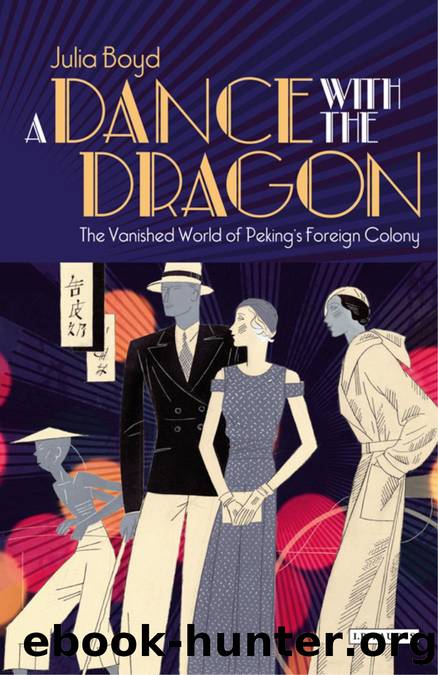A Dance with the Dragon by Julia Boyd

Author:Julia Boyd [Boyd, Julia]
Language: eng
Format: epub
ISBN: 9780857731845
Published: 2019-11-21T16:00:00+00:00
10
PICNICS AND PONIES
âMy clothes are a screaming success and I am cutting a spectacular dash,â wrote Alice Green Hoffman from Peking in January 1925. Mrs Hoffman, a wealthy American matron related to the Roosevelts, was a guest of the British Minister and his wife, Sir Ronald and Lady Macleay. Entranced with Peking (where there was no prohibition) she expected it soon to become the social centre of the world â not least because a case of champagne cost only 30 dollars.1 By âPekingâ she was of course referring only to its foreign residents and more especially to those living within the legation quarter where life still went on much as before. To the likes of Mrs Hoffman this was the real world while the Peking that existed beyond its walls was little more than a grubby inconvenience.
In fact, it seemed that nothing, not war, revolution, famine or Bolshevism, could be allowed to interrupt the flow of social life. âSo, while outside the legation quarter Reginald Johnston yearned for the restoration of empire and the Communists for social revolution; while John Dewey preached democracy and the missionaries repentance, inside the newly arrived wife of the British military attaché Molly Orpen-Palmer was struggling to make up her mind on what to wear at the fancy dress ball on 16 January 1921. It was a difficult decision, but in the end she decided to go as Pierrette:
I called in the legation tailor four days before the Ball and asked him to make me a Pierrette dress. He made me such a sweet one, masses of skirts, the top one being in three flounces with the edges raw. It was all pale pink with touches of black. Rather dainty I think. Everyone thought I had brought my dress out from home. No one could believe the legation tailor had made it in four days. It was very simple once he seized the idea. I would place the stuff at a certain angle and say âCan do?â and he would say âcan doâ. Then I would say âI no like this tailorâ, pointing to a part of the dress. âCan do like this?â And he would say âcan do, can doâ. Once he had said âcan doâ all was well.2
Molly, in common with most foreigners, admired her Chinese servants and with good reason. For it was their ingenuity, humour and cheerful acceptance of their employersâ idiosyncrasies that not only made life possible for them in Peking but, as the century progressed, increasingly desirable. But while the Westerners were pleased to sing their praises (too often like the proud owner of a clever pet), few were prepared to admit that without their boys, amahs, cooks and rickshaw coolies they could barely have survived one day in China. Sir Alexander Hosieâs conviction that as a white foreigner (and especially as an Englishman) he was innately superior to all Chinese was hardly unique. After seven years away, he returned to Peking in 1920, delighted to find âJumboâ, the
Download
This site does not store any files on its server. We only index and link to content provided by other sites. Please contact the content providers to delete copyright contents if any and email us, we'll remove relevant links or contents immediately.
| Central Asia | Southeast Asia |
| China | Hong Kong |
| India | Japan |
| Korea | Pakistan |
| Philippines | Russia |
The Sympathizer by Viet Thanh Nguyen(4385)
The Rape of Nanking by Iris Chang(4203)
World without end by Ken Follett(3474)
Ants Among Elephants by Sujatha Gidla(3463)
Blood and Sand by Alex Von Tunzelmann(3195)
Japanese Design by Patricia J. Graham(3167)
The Queen of Nothing by Holly Black(2588)
City of Djinns: a year in Delhi by William Dalrymple(2554)
Foreign Devils on the Silk Road: The Search for the Lost Treasures of Central Asia by Peter Hopkirk(2463)
India's Ancient Past by R.S. Sharma(2451)
Inglorious Empire by Shashi Tharoor(2437)
Tokyo by Rob Goss(2427)
In Order to Live: A North Korean Girl's Journey to Freedom by Yeonmi Park(2387)
Tokyo Geek's Guide: Manga, Anime, Gaming, Cosplay, Toys, Idols & More - The Ultimate Guide to Japan's Otaku Culture by Simone Gianni(2369)
India's biggest cover-up by Dhar Anuj(2351)
The Great Game: On Secret Service in High Asia by Peter Hopkirk(2345)
Goodbye Madame Butterfly(2251)
Batik by Rudolf Smend(2179)
Living Silence in Burma by Christina Fink(2068)
